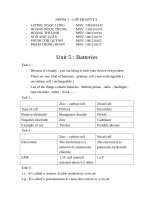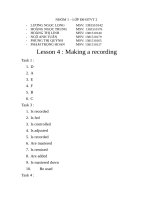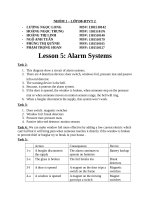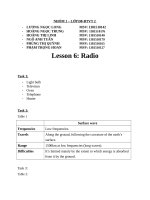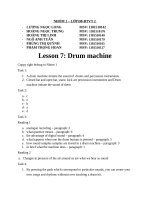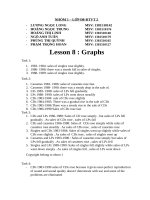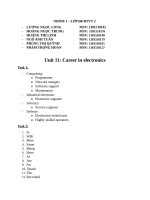ĐIỆN tử VIỄN THÔNG DTVT2 nhom1 bai5 khotailieu
Bạn đang xem bản rút gọn của tài liệu. Xem và tải ngay bản đầy đủ của tài liệu tại đây (116.31 KB, 3 trang )
NHÓM 1 – LỚP Đ8-ĐTVT 2
-
LƯƠNG NGỌC LONG
HOÀNG NGỌC TRUNG
HOÀNG THỊ LINH
NGÔ ANH TUẤN
PHÙNG THỊ QUỲNH
PHẠM TRỌNG HOAN
MSV: 1381510142
MSV: 1381510176
MSV: 1381510140
MSV: 1381510179
MSV: 1381510165
MSV: 1381510127
Lesson 5: Alarm Systems
Task 2:
1. This diagram show a circuit of alarm systems.
2. There are 4 detection devices: door switch, windows foil, pressure mat and passive
infra-red detector.
3. The warning device is the bell.
4. Because, it protects the alarm system.
5. If the door is opened, the window is broken, when someone step on the pressure
mat or when someone moves on motion sensors range, the bell will ring.
6. When a burglar disconnects the supply, this system won’t work.
Task 3:
1.
2.
3.
4.
Door switch: magnetic switches
Window foil: break detectors
Pressure mat: pressure mats
Passive infra-red detector: motion sensors
Task 4: We can make window foil more effective by adding a low current electric which
can't kill but it will bring pain when someone touches it directly if the window is broken
to prevent thief or burglar try to break in your house .
Task 5:
2-e
Action
A burglar disconnects
the supply
The glass is broken
Consequence
The alarm continues to
operate on batteries
The foil breaks too
3-f
A door is opened
4-a
A window is opened
A magnet on the door trips a
switch on the frame
A magnet on the moving
part trips a switch
1-c
Device
Battery backup
Break
detectors
Magnetic
switches
Magnet
switches
5-g
6-b
7-d
You’re not there to reset
the system
A burglar tries to force
the alarm open
Someone steps on them
The alarm stops after a set
time
Tamper sensors trigger the
alarm
Two thin metal plates come
in contact
Automatic cutoff
Tamper
protection
Motion sensors
Task 6:
1. If pressure mats are constantly walked on, two thin metal plates will come in
contact.
2. If you fit an exit delay, you won’t set off the alarm when leaving the house.
3. If your system doesn’t have an automatic cut-off, the noise will go on for
hours.
4. If a burglar walks in front of a motion sensor, the alarm will turn on.
5. Vibration sensors will respond if the window foil is broken.
6. Tamper sensors will trigger the alarm if a burglar tries to force the box open.
7. A magnet on the moving part trips a switch if the door is opened.
8. The alarm stops after a set time if it has an automatic cut-off devise.
Task 8:
-
Integrated circuit (1f)
Circuit supply (2d)
Alternating bias (3h)
Primary cell (4b)
Zener diode (5e)
Remote control (6i)
Reed switch (7c)
Surface wave (8k)
Vibration sensor (9a)
Reverse current (10g)
Main diagram (11j)
Task 9:
1.
Sensing device
Used to detect
LDR
Light
Thermistor
Heat
Microphone
Sound
2. When light falls on the LDR, its resistance decreases.
3. Using RV1 to adjust the sensitivity of the input.
4.
Term
Opposite
Cut- off
saturation
Fixed resistor
Variable resistor
increases
decreases
energize
De-energize
Slow
rapid
To cause
To prevent
Forward bias
Alternating bias
5. The transistor in Fig. 2 protected from a large back EMF by a diode which is connected
in reverse bias across the relay.
Task 10:
1.
2.
3.
4.
The diagram shows a reed switch.
The reeds sealed in a glass envelope to protect them.
Because it helps to prevent corrosion of the contacts.
When a magnet is brought close to the reeds, they are magnetized, attract each
other, and close. When the magnet is removed, the reed open.
Task 11:
1. The components are: switch, alarm bell or buzzer, battery, reed switch.
2. A 9V battery is connected to a set alarm switch and a set alarm switch is connected
to an alarm bell. An alarm bell is linked to a reed switch.
3. The circuit is open and nothing happens.
4. The alarm will ring.
5. Because when the magnetic insert in frame is brought close to the reed through
open, the reeds create a closed circuit and operate the circuit.
